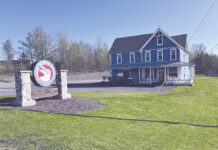
TALLMADGE, Ohio — Living City Farms started out as an urban farm for Ms. Julie’s Kitchen, a vegan restaurant, in Akron.
It’s growing bigger than that, now. But it’s still relying on connections to the restaurant and community.
The farm and the restaurant are both owned by Good Place Holdings, a company that seeks to build up “good places” in the community, farm manager Steve Larson said. The farm receives funding from the organization, along with centralized and shared business resources, like accounting and marketing support.
“A lot of the things that small business owners have to do, but they don’t necessarily have the time to do or want to do, they’re trying to have the resources,” Larson said.
Having that extra support can make a big difference for a small farm. At Living City Farms, it’s just Larson and assistant farm manager Em Evans. Larson and Evans used to farm on three lots in Summit Lake, but have shifted much of their work to a new location, in Tallmadge, and are only farming two lots in the other city.
Small scale vegetable production is an intensive process, Larson said. Larson, 31, and Evans, 26, are planning to plant crops that don’t need daily attention, like elderberries, at the Summit Lakes locations, so they don’t have to travel back and forth as much.
The farm’s location, in Tallmadge, puts it right in the middle of a residential area. Evans sees that as an opportunity.
“We think this space can really invite people into deeper relationships and is well placed to be not only a production farm, but a community oriented space,” Evans said.
Getting involved
Larson started gardening in high school. He volunteered at farms while he was in college at Kent State University and eventually got a job at a farm near the university for his last two years of school. After that, he spent two years traveling the U.S., Mexico and Central America by bicycle.
After living on a bicycle for two years, he couldn’t imagine working in an office. He got a job with Ms. Julie’s Kitchen, working on the urban farm she used to supply her restaurant.
Julie Costell started leasing vacant land and paying for water from the city in the Summit Lake area in 2012 to help supply her restaurant. Her business was growing, and while some vendors were able to keep up with the volume she needed, she had a hard time finding enough of certain products, like raw peas.
When Larson started working for Costell, he was paid partly in room and board. He stayed at her house and would ride his bike to and from the urban farm nearby. He was interested in learning, so she taught him what she knew.
“It’s really been especially nice to watch Steve grow,” Costell said. “I really like to work with people who are interested and who take an initiative to learn.”
That applies to her restaurant, as well as to the farm. She can teach someone to follow a recipe. She can’t teach them passion and yearning for knowledge. Larson had those things, and he came in at a time when Costell had work to be done — it was just her running the business.
“He bought in, and look where we’re at now,” Costell said.
After working on the restaurant’s farm for about two years, Larson left for a year to do an apprenticeship. Then, he pitched an idea for a homestead farm on the Tallmadge property, to Good Place Holdings.
The holding company already owned the land in Tallmadge and needed someone to manage the land. Part of the goal was to make sure the farm manager could be paid a living wage. But Ms. Julie’s Kitchen still needed someone to work on the restaurant’s urban farm.
So Living City Farms got started on the lots in Summit Lake, with the intention of expanding onto the Tallmadge property later on.
The person who started Good Place Holdings was Costell’s business mentor for about 20 years. Costell decided to sell her restaurant into the company when she realized that, as she approaches retirement, she doesn’t have anyone interested in inheriting her business.
“My business was too big for me to manage, and we had too many opportunities, including an actual farm,” Costell said. “I couldn’t manage both or financially sustain both.”
Now, the farm and the restaurant are essentially sister companies, both owned by Good Place Holdings. The holding company offers funding as well as support on accounting, marketing and other things on the business side.
“When you’re running a business, there’s a lot of moving parts,” Larson said. “With farming, there’s a lot to focus in on of just growing the food and trying to steward a healthy ecosystem, so with accounting and marketing and things like that, they are working on building their systems to help out.”
Now, the farm is starting to transition to a permaculture system on the Tallmadge location.
“It’s cool to see it finally coming to fruition,” Evans said.
Evans, who is a nonbinary and transgender farmer, came to farming after they started to burn out on activism with food justice organizations. They volunteered through Americorps at Franklinton Farms, in Columbus, but did more work with organizing volunteers than with actual farming.
“I wanted to dive deeper,” Evans said. “It felt funny to manage volunteers and not know what I was doing, myself.”
Evans met Larson at the Summit Lake Farmers Market and continued to bump into him while interning with Countryside’s New Farmers Academy. Eventually, Larson hired Evans as a part-time farm hand in 2019. Now, Evans is the assistant farm manager for the farm.
Growth
The farm’s connection to Ms. Julie’s Kitchen provides opportunities. The restaurant has always done a lot of to-go orders, so when the pandemic hit, it was well placed to adjust.
That meant the farm still had a steady customer base throughout 2020 for many of its products.
“The new work is just building the market outside of that, because we need to for the financial viability of the farm,” Larson said. “But it’s super convenient having the restaurant being our main customer because of the relationship that we have. There’s no need for us to market to them … so, it just kind of takes away a lot of the things that you have to do for any other sales outlet.”
The farm is the restaurant’s main supplier in the summer, Costell said, though she also works with another 20-30 local farms.
“For me, it all boils down to quality of food, quality of life, quality of community, quality of land,” she said. “I’m very particular about such things.”
The restaurant’s relationship to the farm helps Costell make sure she’s able to get the ingredients she wants, and of the quality she wants. The farm still grows primarily for the restaurant, but Larson and Evans take some crops to the Summit Lake Farmers Market, and are working on growing other sales.
The farm is developing an online sales platform this year and is hoping to partner with other Ohio producers on that platform. Last year, they sold some produce online through Good Place Holdings, but this year, they will have their own website for people to place orders.
“We wanted to expand to other people that are interested,” Larson said. “Being in Tallmadge, there’s houses all over the place here, really close by.”
Ecosystems
Larson now has a lot more experience in farming than when he first pitched the farm idea. At that point, he knew he wanted to use a no-till system. He always heard people talk about environmental issues associated with tillage.
“But aside from a backyard garden or a 2,000-acre farm, I wasn’t really seeing what to do in that in-between spot of the farming that I was doing,” Larson said. “None of the farms I was at even were thinking about doing that.”
Over the years, he started to figure it out and saw more and more small scale growers using no-till systems.
“Now there’s a pretty large movement of small scale growers that are having no-till production systems,” he said. “If we were to have started back then, we wouldn’t have had the experience.”
But much of his vision for the farm has stayed similar to what it is now. He wants to have fruit trees mingled in with the vegetables, in a manageable way, but in a way that approaches the farm as a whole ecosystem.
“We’re finally at the point where we can start doing it and not just dreaming about doing it,” Larson said.
Larson sees agriculture as a sacred process. He believes having a diverse operation helps bring forward that sacredness. It also provides benefits for the plants themselves — trees can function like a hedge row to create a wind break and provide some shade for other plants. Biodiverse fields can bring in more pollinators and other beneficial insects.
“I think that there’s an element of enjoyment of production areas … that feeling of being in a forest, or in a park, or just surrounded with more biodiversity,” Evans said.
Future
Within the next couple of years, Larson and Evans hope to have the whole farm in production with fruit trees, vegetables and other perennials.
They are planning to get several more high tunnels for greenhouse production, if they can get a grant to help cover the costs. They are working on fixing up a barn on the farm so it can be used for a produce wash station and walk in cooler eventually.
While tours and workshops, and most volunteer work had to be put on hold for 2020, the farm has had volunteers help out consistently, or with specific projects, like putting up a high tunnel, at different points. When Costell was running the farm, community members often volunteered to help out at the farm.
Larson and Evans plan to bring that back in the future, and have the farm be a community hub, with a volunteer program, tours and workshops.
“I think that would be really beautiful, to be able to grow relationships with people around here and be cultivating not only food, but community,” Evans said.















